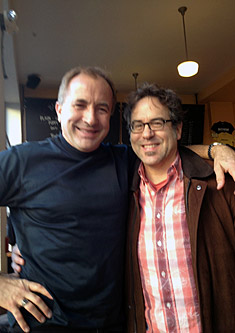Coincidences and Certainties
On the morning of Friday, November 16, 2012, I wandered out of my hotel in Portland, Oregon—The Crystal Hotel, an exotic boutique hotel with rooms decorated in the theme of a musician, poet, or artist (I stayed in the Allen Ginsberg room staring at a portrait of the beat poet and realized why I write nonfiction). In search of breakfast, I could have turned left or right as I exited the lobby. I turned right. At the first intersection I could have continued straight, gone left, or gone right. I went left. There were breakfast restaurants on both the left and the right side of the street. I chose one on the right. The hostess asked if I wanted to be seated near the window or next to the wall. I chose the window. About half way through my breakfast I happened to look up to see a man walking by who looked familiar. He looked at me with similar familiarity. I waived him into the restaurant. He spoke my name in recognition. I stuttered and stammered and hemmed and hawed and finally admitted, “I’m sorry, but I can’t remember your name.” He said, “Uh, Michael, it’s me, Scott Wolfman, your agent!”
After I recovered from my embarrassment and momentary fear that I’d never get another speaking engagement, we had a laugh about it all, but then got to thinking—what are the odds of something like this happening? I’m from Southern California and Scott is from Connecticut. And we happened to run into each other in Portland, Oregon, a city neither of us normally has any business being in. I was randomly walking about the town, as was Scott. We were stunned. It sure seemed like something more than a coincidence, and we both joked about how there must be some sort of scheduling god who makes these things happen.

But Scott and I are good skeptics. We know how to think about such events. Even though such coincidences as this really stand out as unusual—and they are when I describe it in this manner—most people forget to consider all the other possibilities: the thousands of people I know who didn’t happen by that diner, the delay at the diner talking to Scott when I might have left earlier and had something else unusual happen that now didn’t, all the other cities I’ve traveled to and dined in when I didn’t see anyone I knew, and so on. And the same for Scott: he has hundreds of clients and knows thousands of people in the lecture business, any one of which he would ever happen to bump into in any given city he happened to travel to, would stand out as unusual.
In other words, after the fact we construct all the contingencies that had to come together in just such a way for one particular event to happen, and then we only notice and remember (and later tell stories like the above) about the events that we noticed as extraordinary, and conveniently forget to notice all the other possibilities. Here’s an article opening you’ll never read:
“A remarkable thing happened to me this morning. When I went out for breakfast I didn’t see a single person I know.”
And yet I’ve had thousands of breakfasts just like this one in which I see nothing but strangers. And, of course, I don’t bother to take note of that uninteresting fact, and I do not give it a second thought. The main cognitive bias at work here is the hindsight bias.
The hindsight bias is the tendency to reconstruct the past to fit with present knowledge. Once an event has occurred, we look back and reconstruct how it happened, why it had to happen that way and not some other way, and why we should have seen it coming all along. Such “Monday-morning quarterbacking” is literally evident on the Monday mornings following a weekend filled with football games. We all know what plays should have been called…after the outcome. Ditto the stock market and the endless parade of financial experts whose prognostications are quickly forgotten as they shift to post-diction analysis after the market closes—it’s easy to “buy low, sell high” once you have perfect information, which is only available after the fact when it is too late. In this story, the hindsight bias was my noticing after the fact all the particularities that had to come together in just such a way for Scott and I to run into each other.
What would have been truly and extraordinarily beyond coincidence is if I had computed ahead of time the odds of running into my lecture agent at that very time and place, and then it happened. But that’s not what happened. My account here is a post-diction—an after-the-fact analysis—instead of a prediction. Unfortunately, most people who are not aware of such cognitive biases fail to consider all the other possibilities, and how the sum of all these possibilities is certainty—something must happen, and 99.99% of the things that happen are uninteresting and unimportant and so we don’t notice or recall them later. This cognitive shortcoming is, in part, the basis of a type of superstition and magical thinking that finds deep meaning in coincidence, while ignoring entirely the certainties that must happen according to the laws of nature and contingencies of history.

